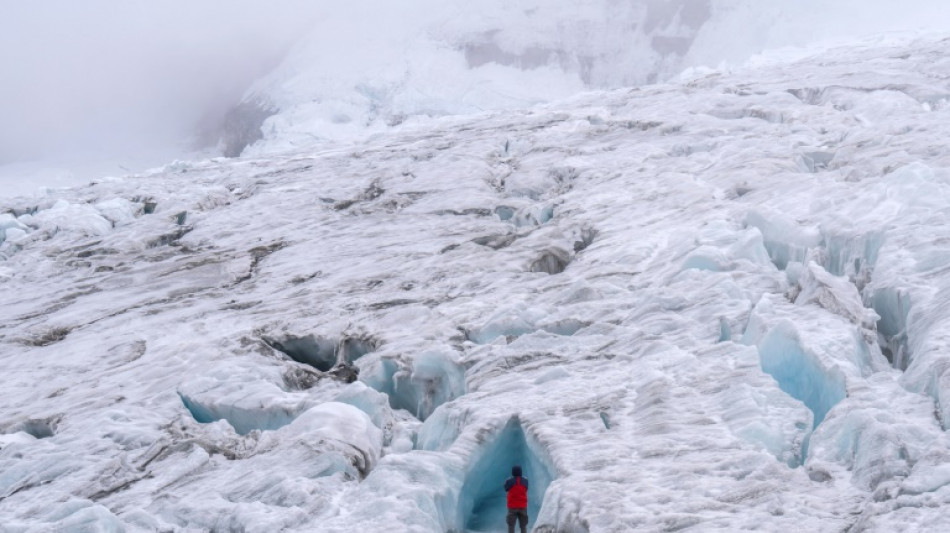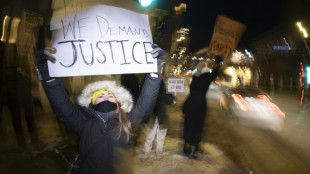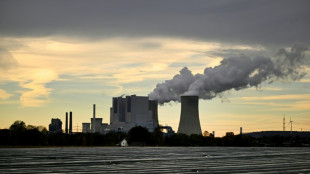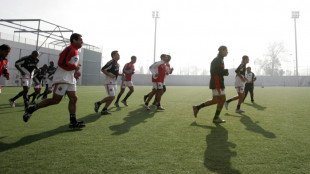
-
 Trump battles Minneapolis shooting fallout as agents put on leave
Trump battles Minneapolis shooting fallout as agents put on leave
-
SpaceX eyes IPO timed to planet alignment and Musk birthday: report

-
 White House, Slovakia deny report on Trump's mental state
White House, Slovakia deny report on Trump's mental state
-
Iran vows to resist any US attack, insists ready for nuclear deal

-
 Colombia leader offers talks to end trade war with Ecuador
Colombia leader offers talks to end trade war with Ecuador
-
Former Masters champ Reed returning to PGA Tour from LIV

-
 US Fed holds interest rates steady, defying Trump pressure
US Fed holds interest rates steady, defying Trump pressure
-
Norway's McGrath tops first leg of Schladming slalom

-
 Iraq PM candidate Maliki denounces Trump's 'blatant' interference
Iraq PM candidate Maliki denounces Trump's 'blatant' interference
-
Neil Young gifts music to Greenland residents for stress relief

-
 Rubio upbeat on Venezuela cooperation but wields stick
Rubio upbeat on Venezuela cooperation but wields stick
-
'No. 1 fan': Rapper Minaj backs Trump

-
 Fear in Sicilian town as vast landslide risks widening
Fear in Sicilian town as vast landslide risks widening
-
'Forced disappearance' probe opened against Colombian cycling star Herrera

-
 Seifert, Santner give New Zealand consolation T20 win over India
Seifert, Santner give New Zealand consolation T20 win over India
-
King Charles III warns world 'going backwards' in climate fight

-
 Minneapolis activists track Trump's immigration enforcers
Minneapolis activists track Trump's immigration enforcers
-
Court orders Dutch to protect Caribbean island from climate change

-
 Sterling agrees Chelsea exit after troubled spell
Sterling agrees Chelsea exit after troubled spell
-
Rules-based trade with US is 'over': Canada central bank head

-
 Lucas Paqueta signs for Flamengo in record South American deal
Lucas Paqueta signs for Flamengo in record South American deal
-
Holocaust survivor urges German MPs to tackle resurgent antisemitism

-
 'Extraordinary' trove of ancient species found in China quarry
'Extraordinary' trove of ancient species found in China quarry
-
Villa's Tielemans ruled out for up to 10 weeks

-
 Google unveils AI tool probing mysteries of human genome
Google unveils AI tool probing mysteries of human genome
-
UK proposes to let websites refuse Google AI search

-
 'I wanted to die': survivors recount Mozambique flood terror
'I wanted to die': survivors recount Mozambique flood terror
-
Trump issues fierce warning to Minneapolis mayor over immigration

-
 Anglican church's first female leader confirmed at London service
Anglican church's first female leader confirmed at London service
-
Germany cuts growth forecast as recovery slower than hoped

-
 Amazon to cut 16,000 jobs worldwide
Amazon to cut 16,000 jobs worldwide
-
One dead, five injured in clashes between Colombia football fans

-
 Dollar halts descent, gold keeps climbing before Fed update
Dollar halts descent, gold keeps climbing before Fed update
-
US YouTuber IShowSpeed gains Ghanaian nationality at end of Africa tour

-
 Sweden plans to ban mobile phones in schools
Sweden plans to ban mobile phones in schools
-
Turkey football club faces probe over braids clip backing Syrian Kurds

-
 Deutsche Bank offices searched in money laundering probe
Deutsche Bank offices searched in money laundering probe
-
US embassy angers Danish veterans by removing flags

-
 Netherlands 'insufficiently' protects Caribbean island from climate change: court
Netherlands 'insufficiently' protects Caribbean island from climate change: court
-
Fury confirms April comeback fight against Makhmudov

-
 Susan Sarandon to be honoured at Spain's top film awards
Susan Sarandon to be honoured at Spain's top film awards
-
Trump says 'time running out' as Iran rejects talks amid 'threats'

-
 Spain eyes full service on train tragedy line in 10 days
Spain eyes full service on train tragedy line in 10 days
-
Greenland dispute 'strategic wake-up call for all of Europe,' says Macron

-
 'Intimidation and coercion': Iran pressuring families of killed protesters
'Intimidation and coercion': Iran pressuring families of killed protesters
-
Europe urged to 'step up' on defence as Trump upends ties

-
 Sinner hails 'inspiration' Djokovic ahead of Australian Open blockbuster
Sinner hails 'inspiration' Djokovic ahead of Australian Open blockbuster
-
Dollar rebounds while gold climbs again before Fed update

-
 Aki a doubt for Ireland's Six Nations opener over disciplinary issue
Aki a doubt for Ireland's Six Nations opener over disciplinary issue
-
West Ham sign Fulham winger Traore

| SCS | 0.12% | 16.14 | $ | |
| RBGPF | 0% | 82.4 | $ | |
| RYCEF | -3.31% | 16.6 | $ | |
| CMSC | -0.68% | 23.64 | $ | |
| VOD | 0.51% | 14.575 | $ | |
| RIO | 0.34% | 93.23 | $ | |
| NGG | 0.4% | 84.65 | $ | |
| CMSD | -0.09% | 24.075 | $ | |
| RELX | -2.81% | 37.31 | $ | |
| GSK | -1.38% | 50.11 | $ | |
| BCC | -1.33% | 80.67 | $ | |
| BTI | -0.34% | 60.135 | $ | |
| JRI | -5.31% | 12.99 | $ | |
| BP | 0.09% | 37.655 | $ | |
| BCE | -0.59% | 25.37 | $ | |
| AZN | -2.38% | 93.38 | $ |

Climate action could save half of world's vanishing glaciers, says study
More than three-quarters of the world's glaciers are set to vanish if climate change continues unchecked, a major new study warned Thursday, fueling sea-level rise and jeopardizing water supplies for billions.
Published in Science, the international analysis provides the clearest picture yet of long-term glacier loss, revealing that every fraction of a degree in global temperature rise significantly worsens the outlook.
It may sound grim, but co-lead author Harry Zekollari, a glaciologist at Vrije Universiteit Brussel and ETH Zurich, told AFP the findings should be seen as a "message of hope."
Under existing climate policies, global temperatures are projected to reach 2.7 degrees Celsius (4.9F) above pre-industrial levels by 2100 -- a pathway that would ultimately erase 76 percent of current glacier mass over the coming centuries.
But if warming is held to the Paris Agreement's 1.5C target, 54 percent of glacial mass could be preserved, according to the study, which combined outputs from eight glacier models to simulate ice loss across a range of future climate scenarios.
"What is really special about this study is we can really show how every tenth of a degree of additional warming matters," co-lead author Lilian Schuster of the University of Innsbruck told AFP.
The paper's release comes as Swiss authorities monitor flood risks following the collapse of the massive Birch Glacier, which destroyed an evacuated village.
While Swiss glaciers have been heavily impacted by climate change, it remains unclear how much the latest disaster was driven by warming versus natural geological forces.
- Cultural and economic importance -
Glaciers are found on every continent except Australia -- from Mount Kilimanjaro to the Austrian Alps and the Karakoram range in Pakistan.
While most are clustered in the polar regions, their presence in mountain ranges across the world makes them vital to local ecosystems, agriculture and human communities.
Vast bodies of snow, ice, rock, and sediment that gain mass in winter and lose it in summer, glaciers formed in the Earth's deep past when conditions were far colder than today.
Their meltwater sustains rivers critical for farming, fisheries, and drinking water.
Their loss can have profound ripple effects, from disrupting tourism economies to eroding cultural heritage.
In recent years, symbolic glacier funerals have been held in Iceland, Switzerland and Mexico.
"The question I always get is, why are you a glaciologist in Belgium?" said Zekollari. "Well -- sea level rise. Glaciers melt everywhere on Earth... and that affects coastal defenses even in places far from mountains."
Around 25 percent of current sea-level rise is attributed to glacier melt.
Even if all fossil fuel use stopped today, the study finds that 39 percent of glacier mass loss is already locked in -- enough to raise sea levels by at least 113 millimeters (4.4 inches).
- Uneven impacts -
One key finding of the study is that some glaciers are far more vulnerable than others -- and the global average obscures drastic regional losses.
Glaciers in the European Alps, the Rockies of the US and Canada, and Iceland are expected to lose nearly all their ice at 2C of warming -- the fallback goal of the Paris accord.
In the central and eastern Himalayas, whose rivers support hundreds of millions of people, only 25 percent of glacier ice would remain at 2C.
By contrast, the west of the range may retain 60 percent of its ice at the same temperature thanks to its wide range of elevations, which allows some glaciers to persist at colder, higher altitudes, said Shuster.
Glacier loss is already affecting communities.
In a related commentary in Science, Cymene Howe and Dominic Boyer of Rice University describe how the retreat of Oregon's Glisan Glacier has imperiled orchards, fisheries, and the cultural heritage of the Indigenous Quinault people.
"Unfortunately we'll lose a lot, but with ambitious targets we can still save many of these glaciers -- which are not only beautiful, but vital for water supply, sea-level regulation, tourism, hydroelectricity, spiritual values, ecology, and more," said Zekollari.
R.Fischer--VB



